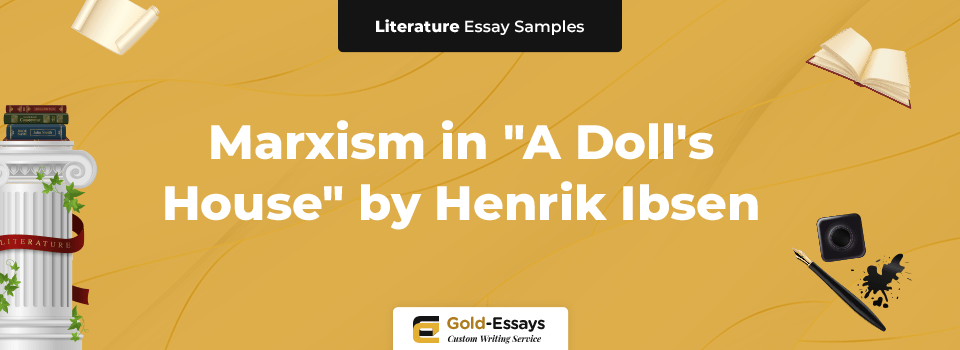
In Henrik Ibsen’s “A Doll’s House,” the specter of Marxism looms large, casting a shadow over the lives of its characters. Ibsen crafts a narrative that transcends mere domestic drama to expose the stark disparities between the haves and the have-nots. Set against the backdrop of Victorian society, the play dissects the corrosive impact of money on human relationships and societal standing. Through the lens of characters like Nora and Torvald, Ibsen delves into the transformative power of wealth, painting a vivid picture of a society ensnared by materialism and class disparities.
We'll write an essay from scratch according to your instructions!
From the very beginning of the play, one can see domination of finance over Noras way of thinking and behavior. The author shows how the woman returns from shopping with a huge number of bags, although she is not able to afford spending so much yet. At this moment, Nora is just under the influence of the perspective to get a higher income in the family because of her husbands promotion. However, the desire to feel wealthy and more confident attacks the woman much faster than the changes in the family budget. Nora is so obsessed with her thoughts about the financial freedom waiting for her in the future that she stops counting money at all. Thus, she doubles the pay for the tree delivery boy and refuses creating her own decorations for Christmas, although she has done this before.
The woman becomes completely different after cultivating an idea that now, she can buy everything she was not able to afford earlier. Nora chooses to buy ready products instead of taking any efforts to create decorations by herself. Now, making something with her own hands is far below her current level of life. It should be noted that the author of A Dolls House resorts to the use of the symbols to depict the changes in Noras character. The Christmas tree is one of them. The woman does not want anyone to see it until it is fully decorated and ready to attract attention. Thus, the Christmas tree stands for Noras unhealthy attitude towards money. She is ready to borrow additional finance in order to let themselves go a bit (Ibsen 18), and here, the reader notices another change in Noras character she stops being economical. The habit of saving every coin and planning family budget is in the past. The thought that now she belongs to a higher class turns Nora into an impatient woman who lives in the now and who does not think about the consequences. She throws money away in order to satisfy her needs. Moreover, the woman prefers borrowing money instead of earning it, as before.
Nora turns into a selfish person and stops thinking about her husband Torvald. For instance, she does not worry about the consequences if they do not return borrowed money back. Debts are not important to her. Moreover, all finance is intentionally taken from complete strangers. The feeling of superiority over people with lower income does not let Nora think reasonably. Her responsibility and sane mind have disappeared and given place to a new bourgeois way of thinking. Now, the woman is not able to understand what harm she can do to others. She is only willing to use lower class in her own interests and extract from other persons as much as it is possible.
Ibsen emphasizes the fact that a new Nora associates freedom with financial well-being (Templeton 142). Thus, she boasts to Kristine that now she feels so light and happy, because of having stacks of money (Ibsen 21). Such a depiction of happiness and confidence is very similar to Marxist domain over a lower class and a tendency to control lives with the help of money. No finance seems to be enough, they always want to get more in order to have and feel power. However, it is impossible to be completely independent, despite having big sums of money. There is always someone to control the situation. The same happens to Nora as well. The woman suddenly realizes that she cannot be free because she does not earn money herself. She is completely dependent on her husband, and she understands that leaving Torvald will mean losing access to the money she is so eager to spend. On realizing this, Nora renounces not only her marital vows but also her financial dependence because she has discovered that personal and human freedom are not measured in economic terms (Lall 97). It is evident that the womans point of view on her life undergoes changes together with the increase of her income. This fact shows the presence of Marxist ideas in A Dolls House. According to it, human thoughts and beliefs are closely connected with their financial status and they are the products of the financial situations people come across during their life.
Although Torvald is not such a spendthrift as Nora is, he also associates freedom with money. Firstly, he does not approve of the idea of asking others for money by the following reply: something of freedom is lost from a home thats founded on borrowing and debt (Ibsen 24). Torvald is happy to feel secure and richer, but he also values the status in society. Being afraid of having too many debts to pay makes him dislike the idea of borrowing money from others. Torvalds earning for respect and high status in society is observed in the situation when Nora tells him about Krogstads forged signature. The risk to lose all reputation influences the mans feelings towards his own wife. Thus, Torvald states that his love has disappeared, and now, it is important to save the bits and pieces, the appearance (Ibsen 26). Suddenly, all gentle feelings towards Nora come back as soon as Krogstad promises to tell no one about the accident and returns the note to the couple. Nevertheless, just like Nora, Torvald worries only about himself. It is easy to see in his reply when Krogstad gives the note Im saved, Im saved! Oh, and you too (Ibsen 28). Thus, the reader can see that Nora does not occupy the first place in her husbands life. To him, reputation is more important than she is. Not by chance, Torvald rejoices over his own safety first and only then remembers about his wife. In contrast to Nora, Torvald does not arrive at a conclusion that associating money with happiness and freedom lead to failure. Therefore, the changes in the family budget have caused harm to their marriage.
However, Nora and Torvald are not the only couple where one can see Marxist themes. Such a relevance can be found in Krogstad and Kristines lives as well. Both of them have committed wrong actions because of the desire and necessity to get more money. They refused to stay pious and honest when they needed to choose between these traits and a better financial situation. Thus, Kristine sacrificed her faithfulness and passion to Krogstad when she found a more prosperous man on her way. She married a different person in order to care about her helpless relatives. As for Krogstad, he had committed a crime because of the necessity to get money for his family. He was capable of doing unimaginable things when he was afraid of losing his major job. Thus, Krogstad even resorted to the use of blackmailing the woman Nora. Moreover, this person does not admit that he has done all these things because of the desire to improve his financial situation. Krogstad blames Noras husband instead, which is a typical action for Marxism followers (Ledger 103). They never understand that the real cause of their problems is hidden in the wrong attitude towards finance and people around.
Even Anna-Marie, Helmers maid, demonstrates an example of the person with a Marxist understanding of life. The woman decided to leave her own daughter in order to earn some money, which spoilt the relations in the family, but Anna-Marie accepted her actions as something what had to happen. Thus, as Velsand writes, she accepts her alienation from her child as if it were natural, given the circumstances of class and money (128). The woman is sure that in her situation, she cannot afford to be depressed by her daughters attitude. Here, Ibsen hints at the idea of the exploitation of the workers by those who possess money. Ibsen does not show this directly, but still, Anna-Marie has to work for the rich and easily accepts this fate. She does not have any opportunity to change her future, and she is ready to live a poor life. Anna-Marie is a typical example of the person from a lower class who just lives the way other people expect from her.
writing service
research
develop your paper
to your e-mail
on plagiarism
account at our site
The majority of the characters, depicted by Ibsen, were stuck in some situation connected with money and they could not change anything. Thus, Nora remains a helpless foolish woman who continues spending her husbands money. Torvald is so attracted by his raise that he does not notice anything around him and he keeps worrying about his reputation. Anna-Marie works for the good of the rich. Only Kristine seems to survive from her financial burden, but she is not satisfied with her life. The woman was rescued from a traditional role waiting for her in the future because of her husbands death. However, she got used to serving the one who was stronger and wealthier. It was easier and more comfortable for her to obey her man and please him. Thus, Kristine tells Nora that she feels her life unspeakably empty. No one to live for anymore (Ibsen 87). Undoubtedly, this phrase also supports the Marxist idea that there are two classes one represents rich and powerful humans and the other is the place for those who are born to serve the first group.
A Dolls House by Henrik Ibsen is a remarkable play that is quite interesting for reading, but it also shares the Marxist doctrine with everyone who tries to understand the authors point of view better. The main idea of this play is to show the changes that the characters face as soon as their financial state improves. On the whole, the people described by Henrik Ibsen can be divided into two classes, according to the Marxist teaching. Thus, Nora and Torvald belong to the middle class and they are driven by power and finance during the entire play. Kristine, Krogstad, and Anna-Marie are the ones who are closely connected with the lower class. They do something wrong in their lives from a moral viewpoint in order to support their families. Thus, A Dolls House is a perfect description of the struggle between two classes that teaches the readers to value something in life besides money.
